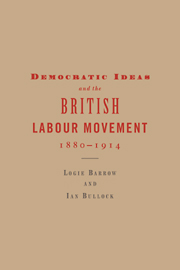Book contents
- Frontmatter
- Contents
- Acknowledgements
- Introduction
- Part 1
- Part 2
- Part 3
- 7 The early 1900s: a hinge period
- 8 Socialists and the state
- 9 Parliamentary socialism? Labour in parliament
- 10 Parliamentary democracy? ‘Fred's obsession’ and the path to the Bradford resolution
- 11 Background to syndicalism: the legacy of the NIGFLTU's failure
- 12 Avoiding the ‘Servile State’. The impact of Syndicalism and Guild Socialism
- 13 1914: an emerging consensus on the eve of Armageddon
- Conclusions
- Appendix: Federation for local Labour historians – and for national
- Index
10 - Parliamentary democracy? ‘Fred's obsession’ and the path to the Bradford resolution
Published online by Cambridge University Press: 09 November 2009
- Frontmatter
- Contents
- Acknowledgements
- Introduction
- Part 1
- Part 2
- Part 3
- 7 The early 1900s: a hinge period
- 8 Socialists and the state
- 9 Parliamentary socialism? Labour in parliament
- 10 Parliamentary democracy? ‘Fred's obsession’ and the path to the Bradford resolution
- 11 Background to syndicalism: the legacy of the NIGFLTU's failure
- 12 Avoiding the ‘Servile State’. The impact of Syndicalism and Guild Socialism
- 13 1914: an emerging consensus on the eve of Armageddon
- Conclusions
- Appendix: Federation for local Labour historians – and for national
- Index
Summary
A critique of Cabinet government
Even before the 1906 election, a species of socialist criticism had emerged which was to become of crucial importance in the immediate pre-1914 years. Its focus was what Hyndman, especially, had always called ‘the unconstitutional Cabinet’, as contrasted with the committee system in local government. The latter seemed to many a model of democracy.
The wide appeal of such a view sprang in part from the fact that socialist and Labour politics were locally well-established before they acquired a national foothold. The 1906 election meant, for some new Labour MPs, a transfer from the local state to the centre. Compared with local government, many features of the House of Commons were bound to seem undemocratic and baroque. F. W. Jowett, with his considerable experience on Bradford City Council, fits this pattern. Even more important was the large body of activists with similar local government backgrounds whose interest in Parliament was greatly increased by their hopes and expectations concerning the performance of ‘their’ MP.
That Labour should contest ‘the tremendous power vested in that close oligarchy known as the Cabinet’ was an argument that first H. Russell Smart and later Jowett had put, before 1906. As early as 1901 Smart wrote:
Parliament has deprived the Government of its regal head, but has left the authority of ministers not only undiminished, but actually increased by voluntarily allowing them to assume all the powers formerly exercised by the monarch. […]
- Type
- Chapter
- Information
- Democratic Ideas and the British Labour Movement, 1880–1914 , pp. 196 - 217Publisher: Cambridge University PressPrint publication year: 1996

